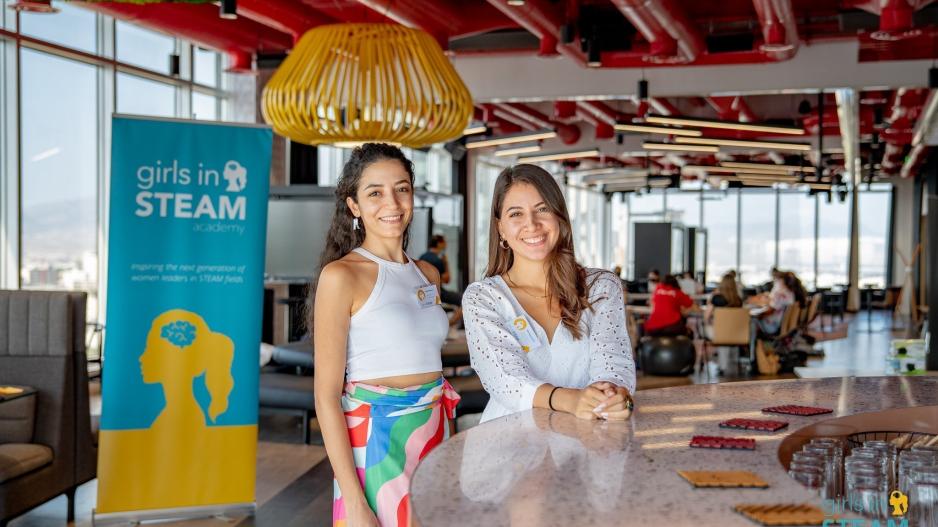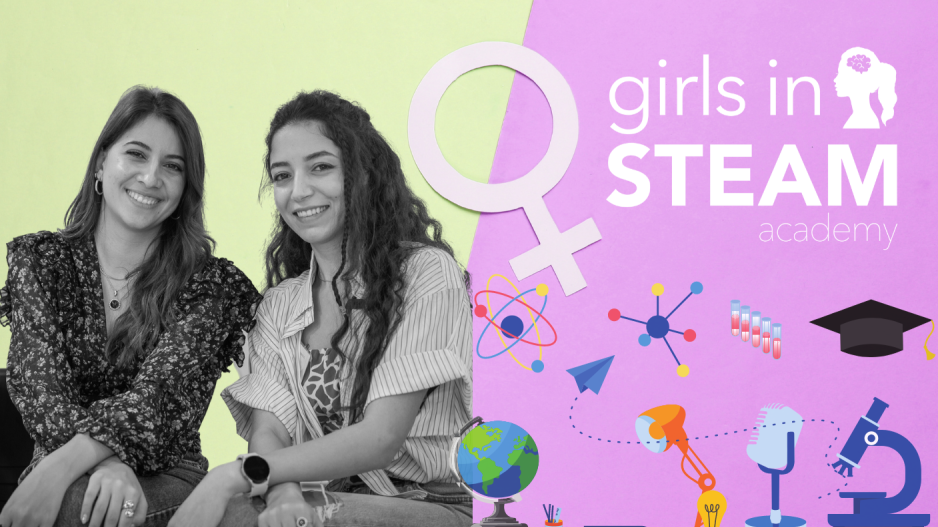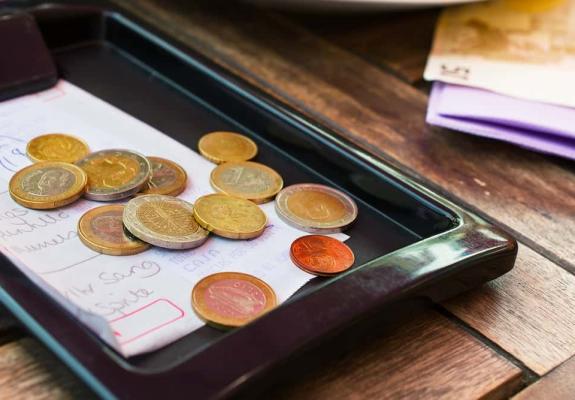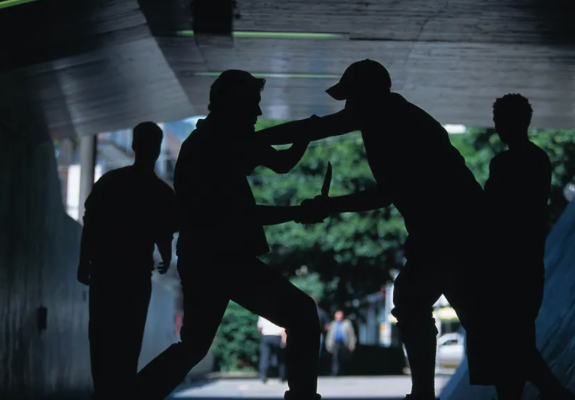Beyond the Glass Ceiling: The Founders of Girls in STEAM Academy Share Their Journey
In this insightful conversation, we have the privilege of hearing from Panagiota Polykarpou and Anastasia Liopetriti, two influential figures passionately advancing gender equality, diversity, and inclusion in Cyprus. Polykarpou, a Gender Equality Specialist & Non-profit Leader, and Liopetriti, a Senior Project Manager at CSI, co-founded the Girls in STEAM Academy, a groundbreaking initiative aiming to close the gender gap in Science, Technology, Engineering, Arts, and Mathematics (STEAM) fields. The Academy stands as a beacon of change, offering engaging activities to break barriers and empower girls and women to reach their potential in STEAM fields.
The interview below delves deep into the co-founders' inspiring journey towards gender equality, the genesis of the Girls in STEAM Academy, and their plans for its future. With thought-provoking answers from Polykarpou and Liopetriti, the discussion touches on their individual inspirations, the transformative impact of their programs, and their perspective on the future of gender equality and diversity in STEM fields. Moreover, they share invaluable advice on how individuals, communities, and businesses can foster gender equality and diversity in their respective spheres, affirming the significance of collective efforts in effecting lasting change.
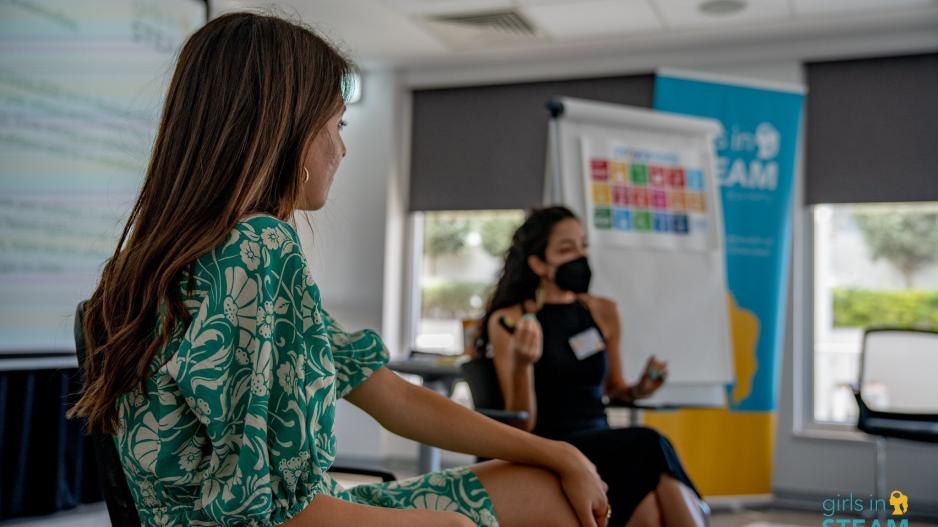
Panagiota: My passion for gender equality, diversity, and inclusion was ignited during my studies at the University of Cyprus. While pursuing my undergraduate degree in Business and Public Administration, I took a class taught by Alexia Panayiotou that shed light on workplace gender issues and discrimination. This eye-opening experience made me realize the lack of awareness in Cyprus on this topic. In response, I co-founded the first digital awareness campaign for equality, "Θκυο Λογια / A few words for Equality," which has since been published as a book in three languages. Additionally, my work at the Cyprus University of Technology exposed me to the underrepresentation of women in STEAM fields, inspiring the creation of the Girls in STEAM Academy in collaboration with Anastasia.
Anastasia: My journey towards gender equality began during my university studies when I enrolled in an introductory course on feminist theory during my undergraduate English Language and Literature studies. This course served as my first formal exposure to the challenges faced by women and other marginalized genders in our society. It ignited a spark within me, awakening a deep sense of curiosity and a passion for understanding the systemic inequalities that persist. Inspired by the course, I pursued a master's degree in gender studies, which further equipped me with the knowledge, tools, and critical thinking necessary to analyze and address gender disparities. Fast forward to 2021, I was lucky to join forces with Panayiota and put all the academic theory into practice, forming the Girls in STEAM Academy initiative.
Girls in STEAM Academy offers a range of activities that aim to break the barriers and stereotypes that prevent girls and women from achieving their full potential in Science, Technology, Engineering, Arts, and Mathematics. One of our primary initiatives is the BridgeSTEAM program, an intensive weekend designed for girls aged 14-18. Through engaging and hands-on activities and challenges, we aim to ignite their passion for STEAM, introduce them to various STEAM careers, and showcase inspiring women role models from Cyprus. These BridgeSTEAM programs are conducted annually between September and December with the generous support of private and public organizations.
By forging partnerships with like-minded organizations, we can broaden our impact, reach more girls, and create a stronger support system
In addition to this, we have launched the SheSpeak Podcast, the first podcast in Cyprus hosted by the young graduates of our programs. The podcast features interviews with accomplished women role models in STEAM fields, providing valuable insights and inspiration to our audience. We also strive to offer ongoing opportunities and benefits to our graduates throughout the year. These include study visits to companies operating in STEAM fields, job-shadowing opportunities, and other valuable experiences that enhance their educational and professional journeys.
Currently, we are actively expanding our network of collaborators and supporters. By forging partnerships with like-minded organizations, we can broaden our impact, reach more girls, and create a stronger support system for gender equality and diversity in STEAM.
The BridgeSTEAM programs for Ukrainian-displaced women and girls had a profound impact on the participants. Thanks to the generous contribution by the American Spaces Programs of the U.S. Department of State, with the support of the CUTing Edge – An American Space (Cyprus University of Technology), Amdocs Cyprus, and Youth Makerspace Larnaka (Youth Board of Cyprus), we were able to provide a transformative experience for these individuals.
The programs not only exposed the participants to the exciting world of STEAM but also served as a source of empowerment and hope. For Ukrainian-displaced women and girls, who have faced numerous challenges and disruptions in their lives in the past year, these initiatives provided a sense of stability and an opportunity to explore new possibilities and expand their network.
The impact of these programs can be seen in the participants' increased self-belief, enthusiasm for learning, and expanded horizons. By bringing them in touch with other women and girls with similar interests, we hope to cultivate a sense of inclusion and belonging to the Cypriot society, despite the difficulties, and a renewed sense of optimism for their future.
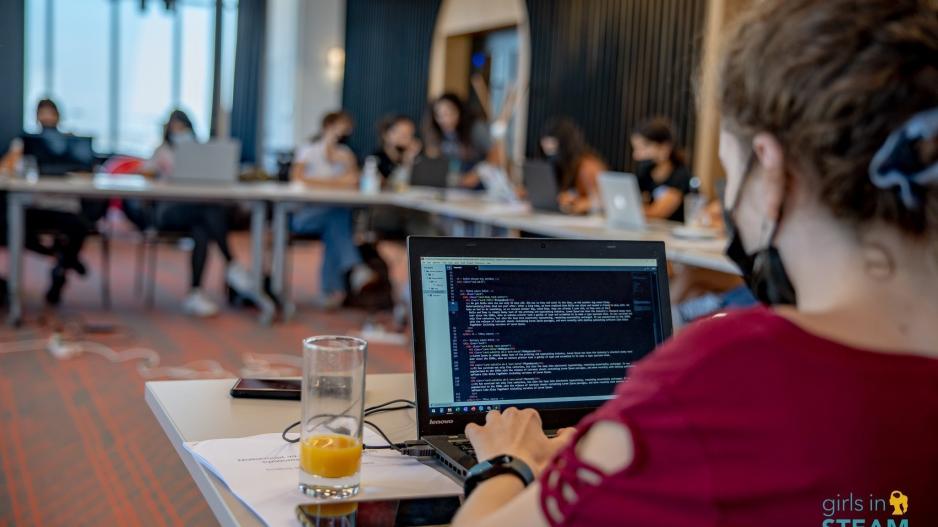
We see a promising future for gender equality and diversity in these fields, but it requires collective and conscious efforts from various stakeholders. Firstly, it is important to identify and address the root causes of underrepresentation and biases that prevent girls, women, and individuals with underrepresented identities from achieving their full potential in these fields. This involves creating inclusive educational environments that break down gender-based limitations and biases from early childhood.
Secondly, workplaces play a crucial role in fostering equality and diversity. It is not solely about increasing the numbers of women and minorities in STEM fields but also about creating supportive and inclusive work cultures that value diverse perspectives and acknowledge the unique needs of individuals. We see fewer and fewer women promoted to higher positions in these fields, but what’s more alarming is the number of women who choose to leave the sector entirely.
Thirdly, and most importantly, to ensure equal representation and equal treatment, the state’s intervention is vital in framing policies and institutional support that allocates resources to support women and underrepresented groups in STEM education and careers, and incentivize organizations committed to diversity and inclusion. By providing necessary financial and structural support, these entities can foster an environment that facilitates positive change.
Being an ally means applying empathy in action. It’s about seeing the person next to us, or the person who is missing who should be next to us, understanding their unique needs and then supporting them to succeed and thrive with us.
If we are serious about becoming allies for our colleagues, family and friends, we first need to check and challenge our own biases and stereotypes and understand what we mean by being allies. Allyship is learning by reading, observing, listening and hearing other people’s lived experiences and needs. According to the author Melinda Briana Epler, it’s about stepping up and stepping in as an advocate, and in some cases, stepping back so that others can thrive. It’s about taking actions to correct unfairness and injustice and removing barriers that prevent people from rising.
Allyship is demonstrated through small everyday actions
Good allies are always learning, unlearning, and relearning. They acknowledge unintentional harm and make corrections to their beliefs and actions. Allyship is demonstrated through small everyday actions, such as speaking up against inappropriate behavior, nominating underrepresented individuals for opportunities, and ensuring recognition of their work.
Allyship is a journey, and each person's path may look different. It requires ongoing commitment and growth as we strive to create a more inclusive and equitable society.
Businesses and companies have a responsibility to create inclusive cultures, build diverse teams and correct systemic inequities in hiring, promotion, pay, and leadership. Yet, we all make a mistake when we see diversity, equality and inclusion as a side project for someone else to solve, rather than the work that all of us need to do together. Therefore, firstly, we need to acknowledge that the topic of equality and diversity is not the responsibility of the people who are underrepresented to address.
In addition to that, when we refer to businesses, we do not refer to buildings and offices. We are our companies, our workplace cultures, and our systems, and these are not changing unless people working there are fostering change. Looking at the systemic inequalities at the workplace, we would advise organizations not to get caught up in planning for too long; choose a lean, agile process to learn, build, test, deploy and repeat. Some specific areas that organizations can focus on are the following:
-
Work on developing inclusive hiring and promotion procedures - Do not blame the pipeline for a lack of diversity; do the work to find diverse candidates and expand your network
-
Diversify your leadership team - The best way to develop diverse leaders is to develop them from within; establish transparent and flexible professional growth and leadership development programs and pathways
-
Partner with and support organizations working on systemic change in the industry - Help fund their work and find creative ways that you can partner together for mutual gain.
And remember, change takes time, and happens one person at a time, one action at a time.
